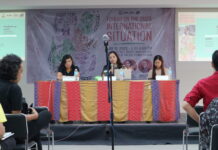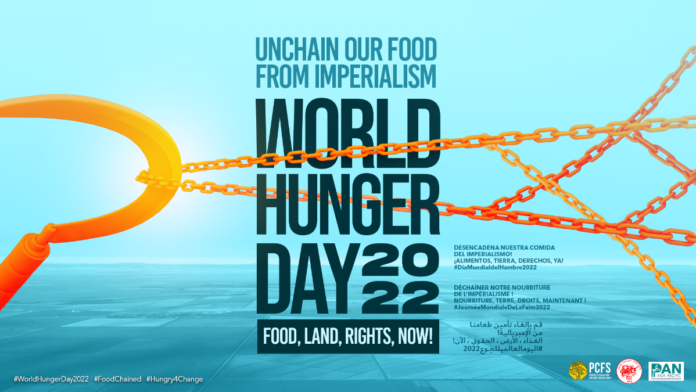Today’s global food crisis is an undeniable manifestation of how imperialism has chained our food.
Global hunger figures are again at an all-time high. In 2021, around 2.3 billion worldwide suffered from food insecurity, while 3.1 billion could not afford a healthy diet. Those affected by hunger increased by 46 million after a year, to 828 million. Hunger is most felt in Africa, where one in every five has faced hunger.
Acute food insecurity soared after Russia-Ukraine war, which triggered the spike in cost-of-living that characterizes today’s global food crisis. As of July 2022, acute food insecurity was present in 82 countries, affecting 345 million people.
An estimated 882,000 are facing the risk of falling into “catastrophic” hunger conditions, and many of the affected countries are in the conflict-stricken region of West Asia-North Africa. The four hunger hotspots at the highest alert are joined by two more countries this year, with famine waving especially in Somalia.
The global food crisis is compounded by climate change, which causes weather extremes that further drive acute food insecurity. Drought in Africa has pushed 23.5 million people in eight countries to crisis-level or worse of food insecurity last year, from 2020’s 15.7 million in 15 countries. In Pakistan, the monsoonal rains in August caused a “superflood” that killed 1,100 people, affected more than 33 million, and washed away farmlands and millions of homes to date.
These figures provide a bit of an overview of the global hunger situation and the state of the current global food crisis amid the ongoing pandemic and climate emergency. The urgency and necessity to radically transform our food systems have never been so stark.
The global corporate food empire is on the move and exploiting these crises, with the imperialist US working proactively behind the scenes.
The US, the world’s largest imperialist power, continues to assert its prominent role in shaping the global food agenda. Pushing the narrative that the Russian government is “squarely and solely” responsible for this cost-of-living crisis due to its invasion of Ukraine, it gathered heads of state and tabled its Roadmap for Global Food Security at a Global Food Security Summit last September 20 on the sidelines of the UN General Assembly.
The US is painting itself as a catalyst of global food security and peace, when in fact it is the world’s leading warmonger, backing the illegal occupation of territories and launching its own wars of aggression that are starving millions.
Representing the agenda of the US and other imperialist powers, the United Nations assumes leadership in the global governance of food toward attaining the so-called 2030 Agenda for Sustainable Development by coordinating global response to the food crisis and issuing policy recommendations consistent with the outcomes of the UNFSS. Its 25-year agenda of action dubbed “Our Common Agenda” is setting the direction by and large for its actions post-UNFSS, marked by a “more networked, more inclusive, and more effective multilateralism.”
With its dominant position in the world increasingly challenged, especially with the rise of China, the US is actively working to maintain its commanding role, including in “shaping the future of the UN.” For the global food systems, this means preserving the current power relations in determining agri-food policies with US imperialism at the helm, continuing the neoliberal onslaught, and perpetuating neocolonial ties with poor countries — the very core of the multiple crises we face.
Corporations, rich nations, international finance institutions, and other neoliberal actors remain to be indispensable in their vision of food systems transformation. Global South countries are still pushed to rely on debt to survive, obligating them to implement neoliberal reforms, band-aid solutions, and corporate-driven technologies that only secure corporate profit. Most importantly, rural peoples and marginalized sectors are still nowhere at the helm of decision-making.
We can only radically transform our global food system into one that is just, equitable, healthy, and sustainable by unchaining our food from this neoliberal order—by breaking the chains of imperialist plunder, unshackling rural producers from poverty and landlessness, and unlinking food systems from unsustainable and destructive agriculture.
In the face of these challenges, the rural peoples of the world never ceased to fight for our right to food and people’s food sovereignty. Movements like the People’s Coalition on Food Sovereignty (PCFS) and its members across the globe have carried on with the struggle for just, equitable, healthy, and sustainable systems, following the successful Global People’s Summit on Food Systems (GPS) last year.
In commemoration of this year’s World Hunger Day on October 16, the PCFS, Asian Peasant Coalition (APC) and PAN Asia Pacific (PANAP) call to Unchain Our Food from Imperialism!
This is the 10th year commemoration of World Hunger Day, which the APC initiated to dispute the UN FAO’s World Food Day celebration and emphasize the real situation and struggles of the rural people especially in the Global South.
Objectives
- Continue exposing the neoliberal global food system and how today’s crises are being exploited to promote pro-corporate, anti-people solutions;
- Highlight the ongoing efforts and struggles of the rural people’s movements following the GPS;
- Introduce the call to Unchain Our Food from Imperialism as part of a long-term campaign for radically transforming food systems amid the hunger and climate crises.
Activities
10AM Chile | 2PM Luxembourg (CET) | 4PM Uganda/Jordan | 6PM Australia (Sydney) | 9PM Philippines/Malaysia
Register: bit.ly/BreakingImperialistFoodChains
To kick off our World Hunger Day campaign this year, an online forum is organized to expose how the continued and intensified neoliberal offensive is taking place in our food systems amid the global food crisis; critique the recent efforts of imperialist powers, including the US’s Food Security Summit, to supposedly transform the global food systems; and reaffirm the calls and demands of the GPS as the immediate and long-term response to the food crisis.
The event is organized by PCFS in partnership with PANAP and International Indigenous Peoples Movement for Self-Determination and Liberation (IPMSDL).
- October 1 to 16 | 16 Days of Global Action
The 16 Days of Global Action on Agroecology is an annual campaign organized and participated in by PANAP and its partners, agroecology advocates and small food producers’ movements. Held from 1 to 16 October, the 16-day campaign is a series of community-initiated awareness-raising activities such as discussion and fora, cultural activities, seed exchanges, food festivals, farmer learning exchanges, rallies and policy advocacy, among others, aimed at promoting and advancing agroecology. It culminates on Rural Women’s Day (15 October) and World Hunger Day (16 October).
- October 13 | IMF-World Bank, Out of Recovery Virtual Speak-out
Sign-on statement: bit.ly/3fs3xYp
Led by IBON International, the IMF-World Bank, Out of Recovery (IWOR) campaign invites all social movements, civil society organizations, and people’s organizations who are concerned about IMF-WBG roles today, and believe that the people should reclaim our economic futures away from neoliberalism and neocolonialism. As part of the year-long campaign’s launch, the virtual speak-out features people’s organizations and civil society groups speaking out on the realities of IMF-WBG harms and their resistance.
- October 14 to 15 | Rural Women Exchange on Agroecology and Food Sovereignty in Uganda
PCFS members Support for Women in Agriculture and Environment (SWAGEN) and the Uganda chapter of Eastern and Southern Africa Small Scale Farmers’ Forum (ESAFF) will be hosting an exchange program where participants will share their experiences, lessons, and insights in advancing women’s human rights, promoting agroecology, and advancing food sovereignty. This is being organized to commemorate the Int’l Rural Women’s Day on October 15.
- October 16 | World Hunger Day Global Action
PCFS calls its members and network to hold on-ground and online actions on October 16, more popularly known as UN’s World Food Day, to expose and oppose the recent efforts to preserve the neoliberal global food system and resound the call to unchain our food. PCFS will culminate the global day of action in Uganda.
- October 17 to 18 | Rural Peoples Conference on Hunger, Land, and Climate
7 AM Luxembourg (CET) | 9AM Uganda/Jordan | 11AM Australia (Sydney) | 2PM Philippines/Malaysia | 3AM Chile


















